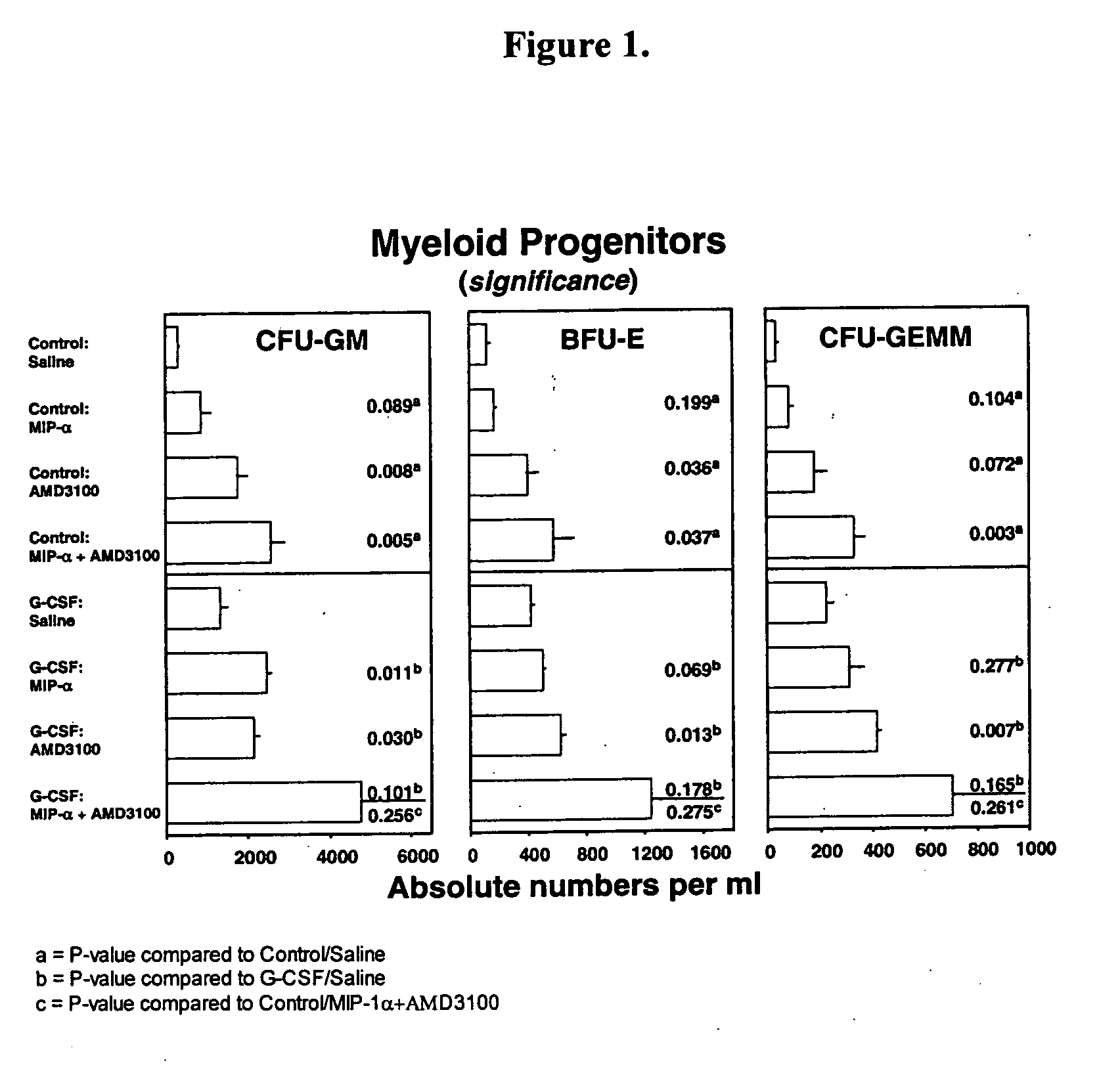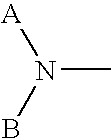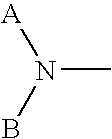Methods to mobilize progenitor/stem cells
a technology of stem cells and progenitor cells, applied in the field of methods to mobilize progenitor/stem cells, can solve problems such as need to add, and achieve the effect of enhancing the population of stem cells and/or progenitor cells and enhancing the production of white blood cells
- Summary
- Abstract
- Description
- Claims
- Application Information
AI Technical Summary
Benefits of technology
Problems solved by technology
Method used
Image
Examples
example 1
Elevation of Mouse Progenitor Cell Levels
[0365] The effects of subcutaneous (s.c.) administration of 1,1′-[1,4-phenylene-bis(methylene)]-bis-1,4,8,11-tetraazacyclotetradecane (AMD3100) to C3H / H3 J mice on numbers of granulocyte macrophage (CFU-GM), erythroid (BFU-E), and multipotential (CFU-GEMM) progenitor cells per mL of blood were measured. Progenitors were stimulated to form colonies in vitro with the combination of 1U / ml rhu Epo, 50 ng / ml rhu SLF, 5% Vol / Vol pokeweed mitogen mouse spleen cell conditioned medium (PWMSCM), and 0.1 mM hemin. Plates were scored 7 days after incubation.
[0366] The time dependent effects on the number of progenitors mobilized with AMD3100 are for a single s.c. injection of 5 mg / Kg and are shown in Table 1.
TABLE 1Absolute Progenitors Per MLBlood Methylcellulose CultureCFU-GMBFU-ECFU-GEMMControl289.849.425.8AMD3100: 15″791.6134.590.4AMD3100: 30″1805.5209.3113.5AMD3100: 120″828.7102.347.6
[0367] To measure the dose-dependent effects, AMD3100 was admin...
example 2
Mobilization of Mouse Progenitor Cells in Combination with MIP-1α and G-CSF
[0370] The progenitor cell mobilization capacity of AMD3100 in combination with mouse (mu) macrophage inflammatory protein (MIP-1α) was tested with or without prior administration of rhu G-CSF. MIP-1α has been previously shown to mobilize progenitor cells in mice and humans (Broxmeyer, H. E., et al., Blood Cells, Molecules, and Diseases (1998) 24(2): 14-30).
[0371] Groups of mice were randomized to receive control diluent (saline) or G-CSF at a dose of 2.5 μg per mouse, twice a day, for two days via s.c. injection. Eleven hours after the final injection of saline or G-CSF, the mice were divided into groups to receive MIP-1α administered i.v. at a total dose of 5 μg, AMD3100 administered s.c. at a dose of 5 mg / Kg, or a combination of both MIP-1α and AMD3100 at the same doses. One hour later, the mice were sacrificed and the number of progenitor cells per mL of blood were measured. These data are summarized in...
example 3
Clinical Elevation of Progenitor Cell Levels
[0373] Five healthy human volunteers having initial white blood cell counts of 4,500-7,500 cells / mm3 were used in the study. Each patient was given a single subcutaneous (s.c.) injection of 80 μg / kg AMD3100 (i.e., 1,1′-[1,4-phenylene-bis(methylene)]-bis-1,4,8,11-tetraazacyclotetradecane) in 0.9% saline, from a stock solution of 10 mg / mL AMD3100 in saline, under sterile conditions. Blood samples were obtained via catheter prior to the dose, and at various times up to 24 hours after dosing.
[0374] The blood samples were evaluated for total white blood cells, CD34 positive progenitor cells (via FACS analysis) as a percentage of total white blood cells, as well as the absolute numbers per mL and cycling status of granulocyte macrophage (CFU-GM), erythroid (BFU-E), and multipotential (CFU-GEMM) progenitor cells.
[0375] As shown in Tables 3 and 4, administration of AMD3 100 caused an elevation of the white blood cell count and of CD34 positive ...
PUM
| Property | Measurement | Unit |
|---|---|---|
| body weight | aaaaa | aaaaa |
| body weight | aaaaa | aaaaa |
| aromatic | aaaaa | aaaaa |
Abstract
Description
Claims
Application Information
 Login to View More
Login to View More - R&D
- Intellectual Property
- Life Sciences
- Materials
- Tech Scout
- Unparalleled Data Quality
- Higher Quality Content
- 60% Fewer Hallucinations
Browse by: Latest US Patents, China's latest patents, Technical Efficacy Thesaurus, Application Domain, Technology Topic, Popular Technical Reports.
© 2025 PatSnap. All rights reserved.Legal|Privacy policy|Modern Slavery Act Transparency Statement|Sitemap|About US| Contact US: help@patsnap.com



